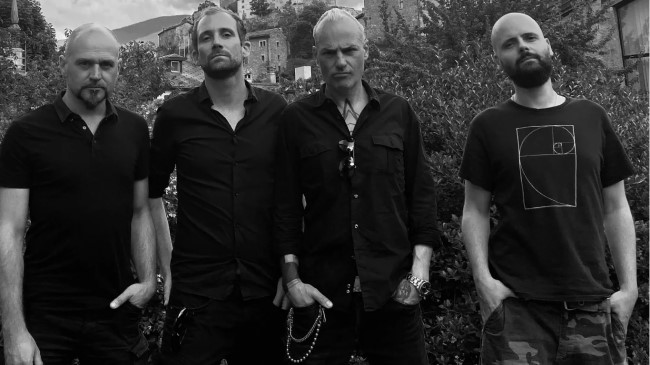
You can support Terra Relicta by donating! Please, do so, and thank you!

The Swiss metal force Samael, the forefather of the so-called industrial/black metal, is one of those bands that needs no special introduction - active since 1987, with 11 full-lengths and several EPs, singles, split albums/EPs and other stuff is one of the leading European bands in the extreme metal scene. The two brothers, Vorph and Xy, are still full of inspiration, even though their latest full-length, Hegemony, was released over five years ago. But this year, we get to hear some brand-new Samael stuff! On its recent European tour, Passage 2022, with the support of Swedish dark metallers Diabolical, Samael also performed in Revolver Club (San Donna Di Piave, Italy), and we definitely got what we came for - a great show. The not-so-moderate number of fans got to enjoy an almost two-hours long Samael live set featuring the entire Passage album and some of the band's "best-of" tracks from all its periods. Before the show, we met with Samael's vocalist/guitarist Vorph for an interview, who also shared some things which have not yet been revealed. Now you probably can't wait to read the interview ;) Most welcome!
Interview with: Vorph
Conducted by: Tomaz and Jerneja
Edited by: Jerneja
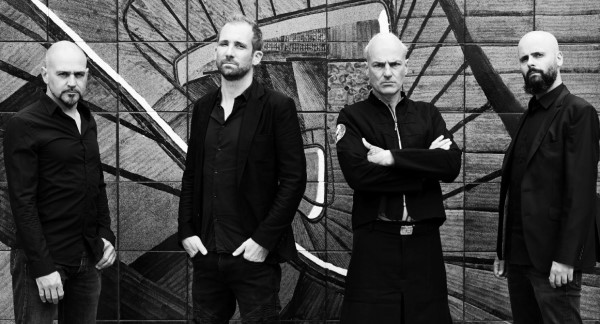 Tomaz: Hello, Vorph! Thank you for taking the time for the interview only a few hours before your gig and for the beers! It passed 26 years since Passage was released. Time flies so fast... How do you feel about it after all this time?
Tomaz: Hello, Vorph! Thank you for taking the time for the interview only a few hours before your gig and for the beers! It passed 26 years since Passage was released. Time flies so fast... How do you feel about it after all this time?
Vorph: It feels good. It is nice to play an album entirely. We did this with Ceremony Of Opposites a few years ago, and I wasn't crazy about this idea before. You know, I prefer playing the new material, but it's a great experience to revisit. You are not exactly the same person, but you, kind of, relate to your songs in a different way. The experiences give you a different approach to the whole thing.
Tomaz: Passage was, at the time, a ground-breaking album; it was one of the first extreme metal albums to use a drum machine and many samples creating this industrial vibe.
Vorph: I believe so. Regarding the drum machine - we are not the only ones, but we are one of the only ones.
Tomaz: Passage was also a ground-breaking album for Samael; it brought worldwide recognition and opened many doors. Also, many tours followed, the headline ones, as well. How do you see it?
Vorph: You are absolutely right; it opened the doors for us. We only started playing at festivals after Passage. We did a few festivals before, but it was all underground. Then we ended up playing at festivals like Wacken; well, it was not Wacken of today. To me, every album is a time capsule of the moment we are living. If I revisit it, I also revisit my past somehow. All the things that were in my mind at the time - kind of - came back. It's easier to deal with it today than before because you - kind of - look down on it, with the experiences and the time.
Jerneja: I find an interesting connection between the album's title and the album as a breakthrough...
Vorph: It was not planned that way, but yeah, true.
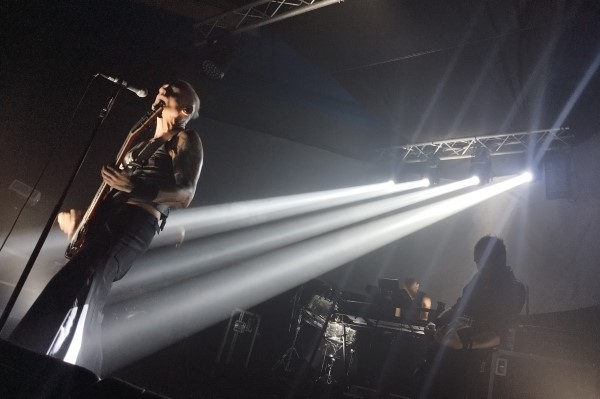 Jerneja: Since we come from Slovenia, I must involve Laibach, one of the bands that influenced you...
Jerneja: Since we come from Slovenia, I must involve Laibach, one of the bands that influenced you...
Vorph: We've never made a secret of that. I'm still a big Laibach fan; everything they release is important and interesting. When they play again in Switzerland - sometime next year, I think - I'm going to be there, of course. I've seen the band live maybe ten times already. I met the guy last time they played in Switzerland, and we had a drink; it was really nice. Yeah, I'm a big fan of Laibach.
Tomaz: Passage was different also lyrics-wise; it's space/cosmic oriented, mystical stuff...
Vorph: To mystical, I would agree, but to space; many people might find this connection because of the album cover art and its follower Eternal, but I don't think there is any connection to the space. Not in my mind, at least. It is more like a spiritual space, which you develop as a spiritual person.
Tomaz: But there are some cosmic-titled songs like "Jupiterian Vibe", "Moonskin", "Born Under Saturn" on Passage, or "Infra Galaxia" and "Radiant Star" on the Eternal album...
Vorph: True enough, but to me, it was more like the experience. I mean, "Born Under Saturn" - I could have said, like, "born in the winter". Saturn is not a ruling planet - by the way, I don't believe in these things, but the fact is that the ruling planet is Jupiter, though the three of us are under Saturn today. And I always liked that Motörhead "Capricorn" song. You know, Lemmy was a Capricorn. It was a retaken song, "Born Under Saturn" - it makes more sense.
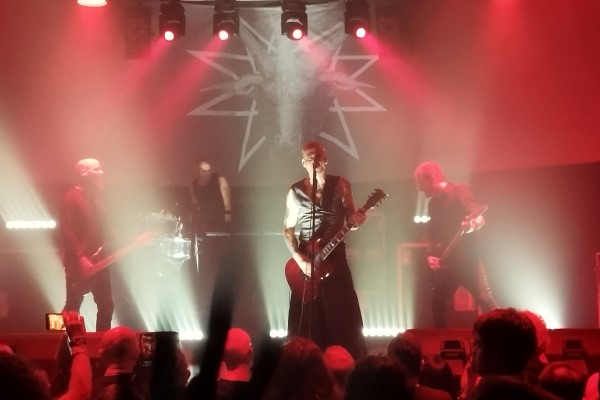 Tomaz: Namely, I'm a huge fan of Reign Of Light and Solar Soul...
Tomaz: Namely, I'm a huge fan of Reign Of Light and Solar Soul...
Vorph: OK, we'll play "Reign Of Light" tonight...
Jerneja: You played many songs from these two albums at a concert in Zagreb in February 2010. You played with Paradise Lost, and it was a great experience being there. I think that tour was soon after the release of the Above album. An album that somehow doesn't fit into the Samael's evolution line...
Vorph: Above wasn't a new album, that's why. It was actually an old album since we composed it before Eternal. It was supposed to be a side project, something really metal. But then we thought it wouldn't work for Samael, so we focused on a new album and left this one for another time. We recorded it right after Eternal, just because we had a special price for the studio. And then we kept it for ten years until we finally decided to release it.
Tomaz: Back to Solar Soul. I find it as one of the most political Samael's album...
Vorph: Maybe... But I don't think we are a political band. As I said when we were doing promotion for the album, nowadays, it's very difficult to isolate yourself from what's happening. Before, it was easier; you just didn't turn on the television. Today, you get information everywhere, on your cellphone... It's like a parasite thing... So it was integrated into the album - just because it was in my mind, and not because I specifically intended, you know.
Tomaz: So, you distance yourself from politics?
Vorph: I'm not a political person. When you speak about music with people who don't like the same things, a compromise is always possible. You can always find a common ground at some point. There is always a band that everybody agrees on this one, at least. In politics, wow, if someone comes out with a strong opinion, they are usually not open to changing their mind but try to impose it on you. And this is the end of the discussion and/or interaction.
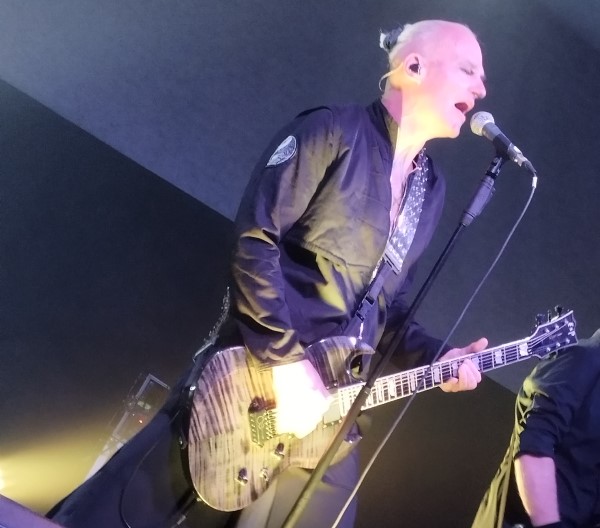 Tomaz: Although the "Western Ground" lyrics are about the migration problem...
Tomaz: Although the "Western Ground" lyrics are about the migration problem...
Vorph: Totally. It's not that people only migrate because of a war. They migrate because of work and because they want to. Sometimes you have the desire to make your life somewhere else. I had this desire, too; there were places I thought of, "yeah, I could make my life here", but - so far - I've never moved from Switzerland.
Tomaz: Samael is now with Napalm Records, but I guess it had many offers...
Vorph: We could have stayed with Nuclear Blast; we were happy with them, but they grew too big for a band like us. They would work on the album for three weeks, and then it's done, and when you called them like two months later, they were like, "when is going to be a new album". The machinery was too big for us... Napalm Records were interested in us even before we signed with Nuclear Blast; it was one of the options. I think we made a good choice; I mean, we have a good connection with the people working there and with the company's owner, Max, who is a really nice guy - smart and quick and a good adviser. It's good to have such people around you, especially when having doubts. For example, we asked him about doing a 7" and a video for "Dictate Of Transparency", and he thought it was a good idea, so we did it. Since the album was already five years old, some other company would say, "you can do 7" for a new album because we don't work for the past". So, I like the cooperation we have with Napalm Records.
Jerneja: Speaking as someone working in the media, I must say that so far, we have had good experiences with Napalm Records. It's one of the rare labels (and PR services) sending well-organized material.
Vorph: It's good to hear it from the other side, as well; from my side, we are totally happy with them.
Tomaz: We heard you are now working on new material...
Vorph: Of course; in two years without a tour, of course, you are going to make new material, but at this point, we don't have a schedule for recording it. It will probably happen sometime in early 2023. We have to finish this tour; then we'll have a few weekend festivals - we play in Portugal and Sweden. We also have some shows in South America. But after we get back, we'll try to get together and make this album as soon as possible.
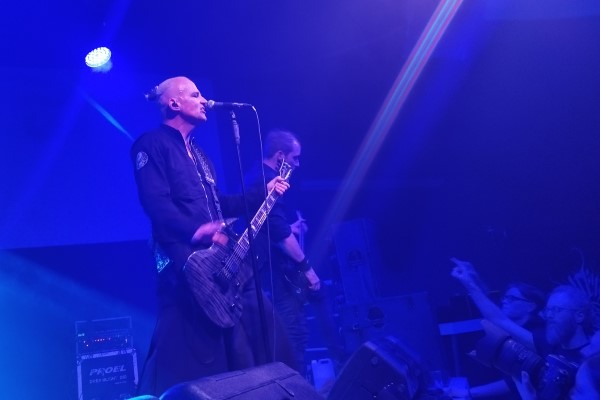 Tomaz: Then there was another project, Worship And Ritual, where you've played the songs from Worship Him...
Tomaz: Then there was another project, Worship And Ritual, where you've played the songs from Worship Him...
Vorph: Oh yes, but that was not exactly a project. We played maybe ten shows, some festivals and a couple of gigs in Switzerland, but that's not something we want to do again. Nevertheless, it was good to play those songs in a different mood. There were no electronics, with real drums, no keyboards, just pure old school "plug the guitar and play" thing. That's it.
Jerneja: Since you released so many songs, I wonder if there is one you prefer to play live?
Vorph: Ah, I guess not. It changes all the time. Ok, on this tour, there's one song that impressed me, and we didn't play that one for a long time - it's "Liquid Soul Dimension". Every night we play it, I think that that is a very different song from what we did before. You know the feeling... Even the guy who does the light show said that every time we played it, it was like going to another concert and returning when it was over. It is one of the songs that I really enjoy on this tour. It depends on how your mind is wired at some point and how you relate to a certain song at the very moment.
Tomaz: To me, "Infra Galaxia" is the most special Samael song... or at least the most atmospheric one, besides "Moonskin", but in a different way.
Vorph: Ok, "Moonskin" is not one of the songs I love to play live; we do it just because it's a part of the Passage album. That song came out when Century Media Records was considered a forefather of the gothic metal scene. They had Moonspell, Tiamat, The Gathering, and some others, but we didn't really fit there. After they heard the album, they wanted "Moonskin" to be the first single. We were against it because we never intended it as a single. We wanted "Jupiterian Vibe" for the first single because it was totally different; I liked the moody atmosphere of the song. We had to fight to have this one because, for them, it was "Moonskin" fitting their vision of that moment in time. Somehow I did understand their opinion, but I'm glad we didn't do it because I still think it was dated. Sometimes when I listen to "Moonskin", I immediately think of it as a typical song of the mid-nineties. I mean, it also sounds like the song from that era, but if I listen to "Jupiterian Vibe", I can't say that; it could be anywhere - it is not grounded in the time frame somehow.
Tomaz: Speaking of timelessness, Passage is one of those albums, if released today, would still sound fresh...
Vorph: That's a very good thing to hear. I'm ok with that.
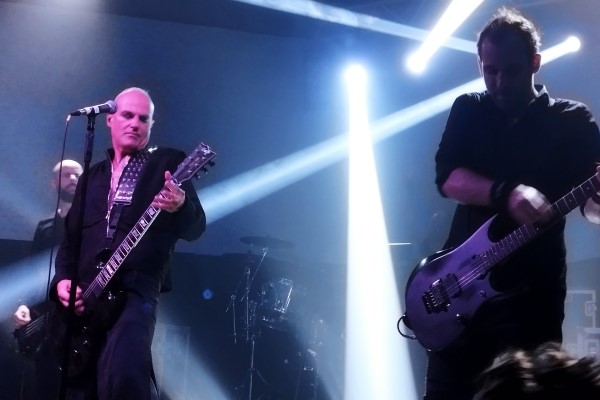 Tomaz: What about videos? You haven't done much of them, but lately, you've released some quite meaningful ones, like "Dictate Of Transparency" and "Black Supremacy"...
Tomaz: What about videos? You haven't done much of them, but lately, you've released some quite meaningful ones, like "Dictate Of Transparency" and "Black Supremacy"...
Vorph: Because I write the lyrics, usually I show Xy the vision I have for it in the first place. Then if he's also ok with it, we share it with whoever will shoot the video. The video producers came up with their interpretation of what I said and how they would make it happen. Then we come up with something eventually.
Tomaz: We've been talking to new modern bands and their producers about the music industry, and they all agree that bands or artists should be present as much as possible. I mean, to release every couple of months a new single, one album or at least an EP every year, being present as much as possible on social media, and so on. Samael is not like that.
Vorph: Yes, but Samael is not a new band; I mean, people who attend our shows are not 12 years old or something; they are in their 30s, 40s, 50s, or even 60s. Our audience is between 25 and 60 years old, I guess. It's still young somehow, but it's not a teenager thing. People who are a little bit older are not checking their Instagram accounts every two minutes.
Jerneja: Has this avalanche of new bands and tons of new releases, in any way, affected Samael? I'm asking this because we get at least 100 emails with promos, news and similar stuff daily.
Vorph: What we feel is the demand. Look, we are fine with our record company now, but the management we had before was totally pushing us to do that sort of thing, but that's just not us. They wanted us to make a film of almost everything, to release videos of almost every festival appearance, mostly to do the promotion for the festival. In my world, it is their job to do the promotion for the festival and not the bands' job. Nevertheless, we do it many times because we want to help. It is a new thing asked of us. Like, if you want to play in a certain place, you've got to be filmed.
Jerneja: I think that lately, many labels, especially newly established ones, do less for bands than in the past. Might it be because the music scene is saturated nowadays, namely, the past years' Covid-related quarantines were somehow musically fertile...
Vorph: Yeah, the label will always ask you to do things. If you want to get signed, you have to do this and that; you need to feed the machine somehow. The more you give, the more they will ask from you. For the release of our debut album, we were desperately looking for a record company. Some labels were OK and wanted to release it, but they didn't want to give us anything for the recording, which for us wasn't an option since we had to repay the bank. We then signed up with the label Osmose Productions, which offered to pay one-half of the recording costs. Nevertheless, at least we had that recording out and, if nothing happened, we would only lose half of the money for making it. The album was selling quite well, and we were able to repay all the costs. I guess that it's hard for any label to take risks. For example, labels such as Nuclear Blast or similar will never or rarely sign with a band that has done nothing before. They usually sign with a band that has already, for example, three albums out with a small underground label, and if they see that the band is solid, then something can happen. Well, if you already did three albums, you've already done something; you are not from nowhere, and they are not taking major risks with you. They know that you are motivated.
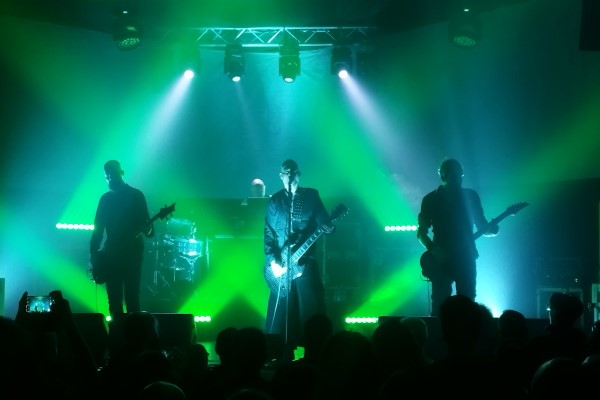 Jerneja: On the other hand, Osmose Productions is quite a known label, but they signed many deals with newcomers, also with, at the time, newcomer Samael...
Jerneja: On the other hand, Osmose Productions is quite a known label, but they signed many deals with newcomers, also with, at the time, newcomer Samael...
Vorph: There was no Osmose Productions label before us. We were the first band who signed with them. I can tell you the story if you want to hear it. As I mentioned before, we recorded everything by ourselves and tried to get a record company to release Worship Him. None of them was interested. At some point, we got a message from Hervé that he wanted to start a label. For us, that was good news; we had our record done, but he asked for one song of us for a compilation tape named A Dawn For A Dog Shelter. That's the story of how we got in contact with the guy. We said yes, and he could choose one song from our demo recordings. I don't know if he got any money with that, but that was supposed to be for a certain dog shelter. When he eventually wanted to do a label, we were OK to sign with him. That was the start of Osmose Productions.
Tomaz: Where do you see Samael in about 10 or 15 years?
Vorph: Ha, I can't really tell. I'm the oldest in the band, and if I will still be in a good shape, I would like to continue touring and doing the same things as today, you know. I'm aware that sooner or later, a moment will come when you can still do it but not as intense. Look at some of my heroes, for example, Angus Young from AC/DC. I saw them playing live around five or six years ago in Barcelona, just before Brian had to leave the band, and wow, these guys... Angus is already an old guy, but he's so energic like he has always been; I mean, wow, and I thought that, maybe, I could do the same as long as he. But you never know; your body might not allow that.
Jerneja: Also, look at Tina Turner or Ozzy Osbourne...
Vorph: Yeah, look at Ozzy, haha. He's not really a good example. He's not really standing anymore. Well, I've seen the last tour of Black Sabbath, and I was happy to see Black Sabbath with Ozzy at least once because I saw them a few times but never with Ozzy. It was good to see it - for the book, but it was not something to be amazed or impressed.
Tomaz: Since you come from Switzerland, I want to ask you about a band from your country I like very much. I'm talking of Sadness; they released three albums back in the 90s, and then they vanished. Another band I miss is Alastis...
Vorph: I knew Sadness; they were from the same area as us. I'm not sure what happened, but I think none of them plays music anymore. I think the singer runs a sports club. He went completely out of music. I don't know about the other guys. They were from the same area, but we weren't really close. We were good friends with Alastis. War D. had a different project at some point, and I'm not sure if he'll do something with Alastis anymore. They were, for sure, a great band.
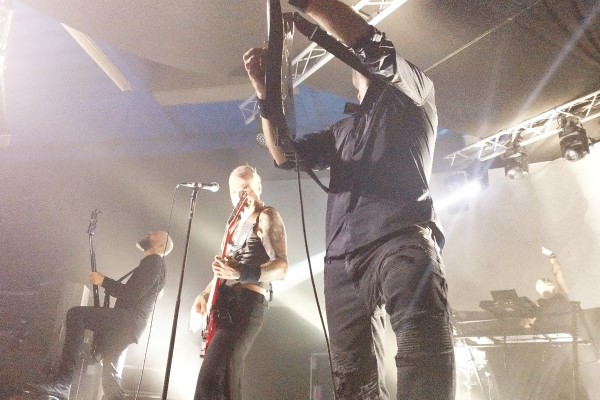 Tomaz: We know you guys mainly because of your music, but what are your other interests?
Tomaz: We know you guys mainly because of your music, but what are your other interests?
Vorph: Mostly, it is music. I'm not listening only to metal or rock music, so I go to see other types of concerts also. Yeah, music is a big part of my life. I also enjoy reading, watching a good movie, and drinking some good wine sometimes.
Tomaz: OK, Vorph; thank you very much for taking your time. Is there anything that you would like to say to your fans and our readers at the end of this interview?
Vorph: Thank you for the support. Especially when we had these two years, as every band had. We know that without our fans, we are nothing. I mean, you can play your songs at home, you can do a new album, but there's nobody to listen to it. You feel the uselessness of what you're doing, and this is, kind of, heavy. Many people have experienced this. Then you are very grateful when you can do it again, to play live and to have a crowd that listens.
Live photos by: Tomaz
Samael links: Official Website, Facebook, Twitter, Instagram, YouTube, Napalm Records
